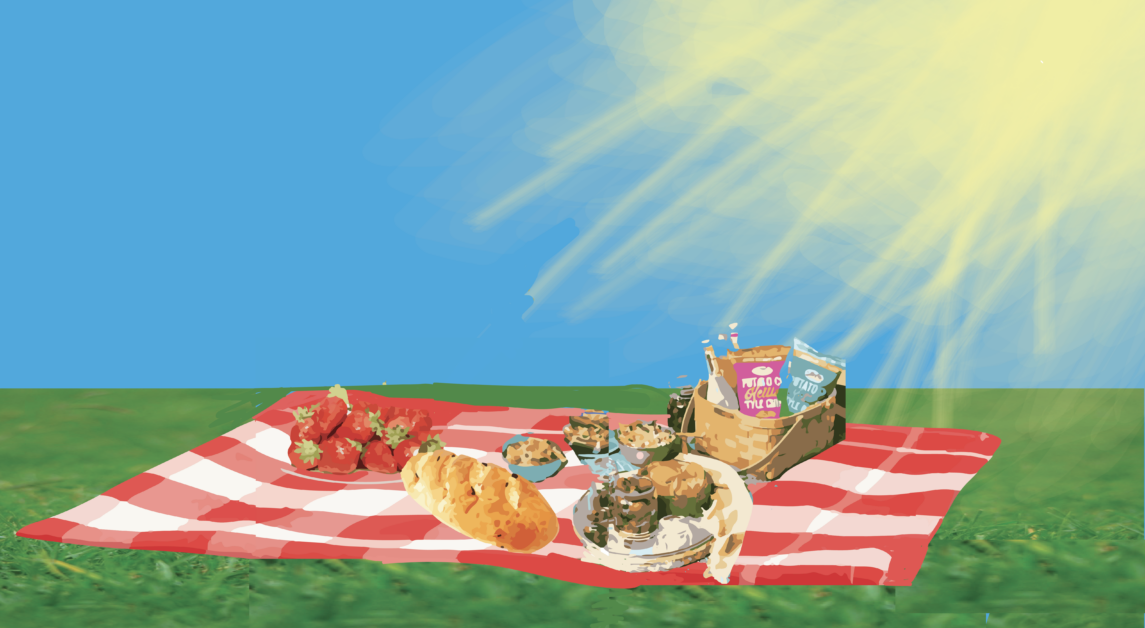There is something so ethereal about eating fruit in the sun. Strawberries specifically, in my opinion, but it doesn’t really matter which fruit. I have the biggest—and I cannot emphasize this enough—soft spot for eating fruit in the sun.
It recharges my soul. I feel whole, filled with love and warmth—not too far from the feeling of hugging someone you love after not having seen them for a while.
Perhaps some of the joy I derive from eating fruit in the sun is because of our species’ relationship with eating outside. For most of our time on this earth, we ate our food that we gathered ourselves in the outdoors. From an evolutionary perspective, our bodies relax and are able to focus in nature.
This connection extends to a time even more recent than the Stone Age—early in our own timelines. There is a certain nostalgia, at least in my experience, associated with eating outside. Eating outside is usually associated with some celebration or other special event, and we would therefore eat with a certain level of excitement at these events. In my family, eating outside reminds me of summer barbecues at my grandparents house, romping around in the woods and then coming back to eat hamburgers. At all of my birthday parties growing up, my parents would entertain the family on our deck. These memories are invaluable to me and definitely contribute to my perception of food outside, even though I mostly ate cheese-doodles at these events anyways.
These evolutionary and personal memories of being outside evoke a sense of attachment to the outdoors. This sensation of feeling more alive in nature is actually named. It’s called biophilia, and theorizes that humans have an intrinsic desire to connect with and be in nature. So perhaps connecting with our original purpose as a human is contributing to my obsession with the fruit-and-sun combo.
I didn’t think that this was the only answer though. And I was correct.
Psychologists have looked into this phenomenon—not into my specific love for eating fruit in the sun, but more broadly on the topic of how our environment can affect our senses and mood. Positive moods are associated with positive environments like nature and natural light. So, when we’re in a good mood, the general conclusion is that the food itself tastes better outside. This could possibly be explained by the connection between taste and smell. With the exception of allergies, fresh air reduces congestion and therefore enables us to taste more acutely because of an unimpeded sense of smell. Our improved smelling abilities outdoors become very important when you consider how we taste things. How something tastes isn’t solely defined by sensations on our tongues—its smell and textures also contribute greatly to how we think it tastes. Indoor air does not allow for the same effect, as it is typically stale with higher levels of humidity.
The fresh air also has an effect on your brain, which affects the way you process taste and all of its associated components. Outdoor air lowers your stress hormones and blood pressure, which allows you to focus fully on the taste of the food and enjoy it more than if you were inside.
Further, nature allows for us to fully slow down at the same time that it engages all of our senses. With all of our senses being put to use, we are able to eat mindfully and take our time to process what we are eating, rather than rushing through the meal to get to our next task. This allows for us to have a more complete relationship with the food that we are eating. We can feel the texture of the food and fully smell and taste it, giving us a multi-sensorial experience unlike when we eat our food inside.
The benefits of being outside in general likely also contribute to the better tasting food. When you are outside, vitamin D levels boost, anxiety decreases, and most people report an increase in happiness as well.
Notably, these effects continue to enhance health even after the meal is complete. Eating outside exposes you to more sunlight, which helps to regulate our ever-important circadian rhythm, which favors eating during the day and not the night. Being more in tune with these internal clocks, better known as our circadian rhythm, improves sleep as it is responsible for the production of melatonin, also known as the sleep hormone. That alone should be enough motivation to at least try to eat a few meals a week outside. This will be increasingly easier as the weather warms, and most students are flocking to the quads or the tables outside Lower to eat a meal and catch up with friends.
Unfortunately, despite all of the benefits of eating outside or being outside in general, the EPA still estimates that Americans spend about 90 percent of their time inside. It follows, then, that most people eat their meals inside as well. And often, we eat our meals alone. Eating outside provides a perfect remedy for this, though—what could be better than combining the benefits of socializing with those of eating and being outside?
The only thing that I could even argue would be better is eating fruit in the sun (recall from my obsession from the beginning).
All that being said, I sincerely hope you try eating outside. I love it, and would be so happy if you discover that you do too.
Featured Graphic by Liz Schwab/ Heights Editor













